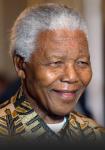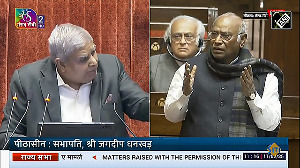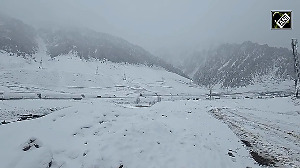 The animated buzz turned to a hush as Charles Philip Arthur George, 55, better known as the Prince of Wales, walked into the Crystal Room of Mumbai's Taj Mahal Hotel Tuesday morning.
The animated buzz turned to a hush as Charles Philip Arthur George, 55, better known as the Prince of Wales, walked into the Crystal Room of Mumbai's Taj Mahal Hotel Tuesday morning.
Carnation firmly in place, he sat attentively through the hour-long presentation organised by the National Association of Software and Services Companies.
Welcoming the Prince, who sat on a dais flanked by the four designated speakers and senior Nasscom and British High Commission officials, Nasscom President Kiran Karnik spoke of India's IT edge, which was based on factors like high quality, vast resources of skilled manpower, conducive regulatory climate and world class infrastructure.
The next person who took to the podium was Ashank Desai, Chairman, Mastek, a multinational IT applications outsourcing company that helped develop the software for the London traffic decongestion programme.
Essentially, this scheme, formally inaugurated on February 17, launched by the Mayor of London to decongest traffic and reduce pollution, involved a £5 fee, payable in advance, for drivers wishing to enter an 8 square mile region of Central London.
But this had to done without slowing down traffic.
The system involves a network of fixed and mobile cameras that photograph the registration number of vehicles entering or moving within the central zone.
There are no tollbooths, gantries or barriers; drivers do not have to stop. The number plate data scanned by the cameras is checked against the registration numbers of those who have paid.
"Defaulters are sent penalty notices, and the charges recovered. The data needed for the application is pretty vast, and has to be captured through multiple channels," said Desai.
He then went on to indicate the size of the project:
A network of 500 fixed and mobile cameras captures number plate details.
- 250,000 vehicles move into the charging zone during the period 7 am-6.30 pm.
- Over 1000,000 images have to be processed each day.
- 75,000 licenses are issued every day. These relate to the payments made by vehicle owners to enter the designated zone.
- Over 64,000 calls are handled per day at call centre. Calls are made by customers to pay license charges, make enquiries, etc.
- Over 100,000 financial transactions need to be posted every day.
- Payments are accepted through multiple channels like POS terminals, Web channel, IVR, and SMS.
All this, said Desai, was completed and delivered in record time. Not only has this brought down noise and traffic pollution, it has also earned revenue for the London Municipality.
The next speaker was Ganesh Natrajan of Zenzar, a leading software solutions provider and a part of two major business groups: ICL (UK), and RPG Enterprises (India), a $1.4 billion conglomerate and the 4th largest industrial house in India.
The next speaker was Jayant V Pendharkar, Vice President (marketing), Tata Consultancy Services. Emphasising that the entire Tata philosophy revolved around giving back to the community, he said nearly two-thirds of the group's funds were invested in charitable trusts.
Apart from many charitable foundations and scientific research bodies, like the Tata Institute of Fundamental Research and the Indian Institute of Social Sciences, the Tatas also institutionalised many scholarships and grants.
"Former President K R Narayanan went to the London School of Economics on a Tata Scholarship," he said.
He then spoke of how TCS was trying to bridge the education gap through the use of IT, and evolved a "computer-based functional literacy methodology, which uses basically low-cost multimedia computers to help people recognise the basic constructs of words in Indian languages, which are phonetic languages."
"This has helped over 20,000 people recognise over 700 words in their language. They can read bus stop signs, bills and other things which are relevant to them," he said.
He then dwelled on TCS, which had recently become a billion-dollar company, with blue chip clients in the United Kingdom, including British Telecom, and the National Health Services, besides multinational banks (like Citibank and HSBC), insurance companies (AIG, AMP) and financial services Morgan Stanley, Merrill Lynch and JP Morgan Chase.
The last speaker was Professor Krithi Ramamritham of IIT-Bombay, and head of the Kanwal Rekhi School of Information Technology, who spoke on 'IT for Development.'
According to Ramamritham, the knowledge revolution was limited to less than 15 per cent of the world population. Most of the research and products are for people in the developed world and it touches less than 2 per cent of the population in developing countries.
"Knowledge society is increasing the divide between the haves and the have-nots. Which is why, in 1840, India and China accounted for 40 per cent of world trade, but in 1998, they accounted for only 3.4 per cent.
Since the absolute number of rural families was expected to grow for the next half century, the IIT, he said, was trying to bring the electronic revolution to the rural areas.
He spoke of village kiosk services, which allowed the villager to access land records, and agricultural prices.
"Even simple technologies can provide significant benefits to rural communities," he said.
Some of the projects at IIT-Bombay include Devanagari text inputs for the Internet, multilingual community fora for rural areas, speech interfaces, and cheap but tough instruments to assess water quality.
Finally, Prince Charles was asked to direct his queries or comment on the presentation. But despite the microphone hastily thrust into his hand, all the journalists present could hear was the polite laughter that accompanied some of his queries and comments addressed to the speakers.
Later, Karnik said that Prince Charles had generally expressed his admiration for all the work being done in India.
As for the laughter, that came when the Prince told Ashank Desai: "You've cleaned up London's congestion. What about Mumbai?"
Prince Charles expressed appreciation for India's growing capabilities in information technology industry and said that would be an another basis for closer Indo-UK ties.
The Prince observed the companies on both sides could benefit from the IT relationship, which should strengthen the relationship between the two countries, Karnik said.






 © 2025
© 2025